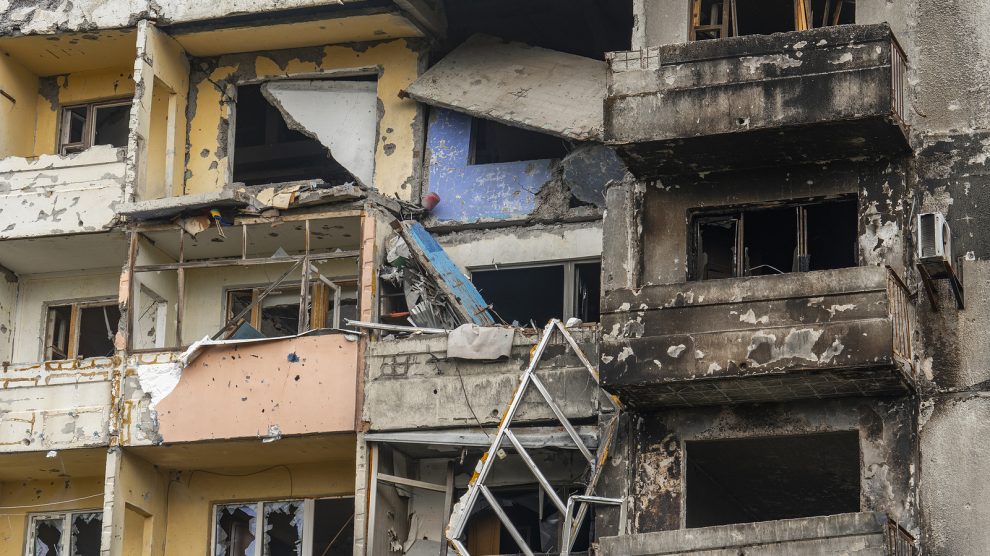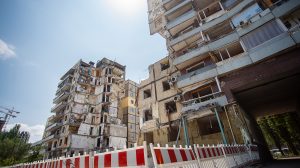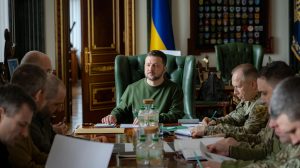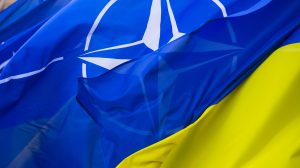You can read all of our coverage of Russia’s invasion of Ukraine, including explainers and articles offering context and background information here.
Russia’s invasion of Ukraine
Russia launched a huge wave of missile strikes across Ukraine while people slept on Thursday, killing at least six civilians, knocking out electricity and forcing a nuclear power plant off the grid.
The first big volley of missile strikes since mid-February shattered the longest period of comparative calm since Moscow began a campaign to attack Ukraine’s civil infrastructure five months ago. President Volodymyr Zelensky said infrastructure and residential buildings in 10 regions had been hit.
“The occupiers can only terrorise civilians. That’s all they can do. But it won’t help them. They won’t avoid responsibility for everything they have done,” Zelensky said in a statement.
Kyiv mayor Vitaly Klitschko said 40 per cent of the city’s residents had been left without heating after attacks on the capital, while the attacks cut the supply of electricity to the Zaporizhzhia Nuclear Power Plant – which is under Russian occupation but relies on electricity supplied by the Ukrainian grid – for the sixth time in the conflict.
The International Atomic Energy Agency, which has monitors stationed at the plant, said diesel generators were being used as an emergency measure to keep reactor fuel cool and prevent a meltdown.
The owner of Russia’s Wagner Group military contractor claimed on Wednesday that his troops have extended their gains in the Ukrainian stronghold of Bakhmut, but it remained unclear how long the grinding fight might go on.
The battle for the city the Ukrainians have dubbed “fortress Bakhmut” has become emblematic of the way each side has tried to wear down the other.
Russian forces must go through Bakhmut to push deeper into parts of the Donetsk province they do not yet control, though Western officials say that capture of the city is unlikely to change the course of the war.
Zelensky vowed on Monday not to retreat from Bakhmut after chairing a meeting with his top generals.
Pro-Moscow authorities in Moldova’s separatist region of Transnistria claimed this week that they prevented a terror attack organised by Kyiv.
Security officials said in a statement on Thursday they had halted “a terror attack… directed by Ukrainian security services, being prepared against a number of officials,” including Transnistria’s leader Vadim Krasnoselsky.
“The suspects have been detained. They have given confessions,” the report claimed, providing no further information.
Moldovan Foreign Minister Nicu Popescu said Russia’s “provocative” comments about a possible Ukrainian attack were untrue.
“The Moldovan authorities have rejected these statements as unfounded, made to manipulate public opinion. The security situation in the region is stable,” he wrote on the Telegram messaging app.
And in Kyiv, Zelensky rejected Moscow’s assertion that Ukraine wanted to take over the region.
On Wednesday, Ukraine’s president and the UN secretary general called for a vital deal allowing Russian and Ukrainian wheat and fertilisers to be exported through the Black Sea to be extended, amid reports that Moscow does not intend to renew its participation.
Ukraine and Russia signed the UN-backed deal for an initial 120 days last July, allowing the export of millions of tonnes of grain from blockaded Black Sea ports, an agreement that was seen as averting the threat of a global food crisis.
A subsequent November extension to the Black Sea grain initiative for a further four months is scheduled to expire on March 18, unless it is extended.
Zelensky and António Guterres said on Wednesday they backed the renewal of the deal, but Russia has already signalled it is unhappy with aspects of the agreement, prompting grain traders to warn of potential risks to supplies, and the impact on global grain prices.

Other news
A Belarus court this week sentenced the country’s main opposition leader to 15 years’ jail in absentia. Svetlana Tikhanovskaya fled Belarus in 2020 after running against authoritarian leader Alexander Lukashenko in presidential elections. She is widely thought to have won. The charges included high treason and conspiracy to seize power. Ms Tikhanovskaya said she was more worried about those with “real” – rather than absentee – jail terms. “Today I don’t think about my own sentence. I think about thousands of innocents, detained and sentenced to real prison terms. I won’t stop until each of them is released,” she said on social media.
Georgia’s ruling party said on Thursday it will drop its bill on “foreign agents” after fierce opposition culminated in two nights of violent protests and criticism that the draft law would limit press freedom and undercut the country’s efforts to become a candidate for EU membership. The Georgian Dream party said in a statement it would “unconditionally withdraw the bill we supported without any reservations”. It cited the need to reduce “confrontation” in society.
Estonia’s ruling Reform party came out on top in Sunday’s parliamentary election, with Prime Minister Kaja Kallas now poised to form a new coalition for her second term in office. Kallas’ liberal Reform party won 37 out of 101 seats — three more than the last election in 2019 — after results were announced in the early hours of Monday morning. The right-wing nationalist EKRE party came in second with 17 seats, down two seats compared to the last election.
Czechia has invited transport ministers from 11 European Union counties to meet in Brussels on Monday to discuss emissions-cutting policies, amid a dispute over the bloc’s landmark policy to shift to electric vehicles. Invited to the meeting are Germany, Italy, France, Spain, Poland, Hungary, Slovakia, Portugal, Romania, Slovenia and Finland, an EU official told Reuters. It is not yet confirmed which ministers will attend. Czech transport Minister Martin Kupka said last week, after meeting his German counterpart Volker Wissing in Berlin, that the country wanted changes to the 2035 ban on new CO2-emitting cars.
Italy’s biggest utility Enel Spa on Thursday said it will sell its Romanian operations to Greece’s Public Power Corp for 1.26 billion euros as part of efforts to cut debt and focus on cleaner energy. Including debt, the deal is valued at 1.9 billion euros, Enel said in a statement, adding that the transaction would generate a positive effect on its consolidated net debt of about 1.7 billion euros. In November Enel presented a 2023-25 strategic update saying it was planning asset sales worth 21 billion euros and aimed to lower its debt to 51-52 billion euros by the end of this year.
PKN Orlen has all but pivoted away from Russian crude at its refineries in Poland, Lithuania and the Czechia a year after its neighbour invaded Ukraine. “We substituted Russian oil without curtailing oil processing,” said Grzegorz Markiewicz, executive director of oil and gas trading at Poland’s largest fuelmaker. “Refinery margins are still good and we are taking full advantage of that,” he said during an interview during the CERAWeek by S&P Global in Houston on Wednesday. Orlen still relies on Russian Urals crude for seven per cent of the oil it processes, down from 30 per cent before the war.
North Macedonia signed on Wednesday a deal worth 1.3 billion euros with Turkish Enka and its joint venture partner, US Bechtel, for the construction of motorways connecting it with ports in Albania, Bulgaria and Greece, Nova Makedonija reported. Enka said on its website the construction will start in 2023 and is to be completed within five years, stressing the complexity of the project, which will require building “34 bridges, 34 overpasses, and 24 underpasses”.
New research based on human skeletons found in Bulgaria, Hungary, and Romania suggests that the ancient Yamnaya people living there were riding horses around 5,000 years ago, seemingly earlier than evidence from other regions. The findings could challenge theories that the Botai people of modern-day Kazakhstan were the first to domesticate and ride horses.
Unlike many news and information platforms, Emerging Europe is free to read, and always will be. There is no paywall here. We are independent, not affiliated with nor representing any political party or business organisation. We want the very best for emerging Europe, nothing more, nothing less. Your support will help us continue to spread the word about this amazing region.
You can contribute here. Thank you.







Add Comment